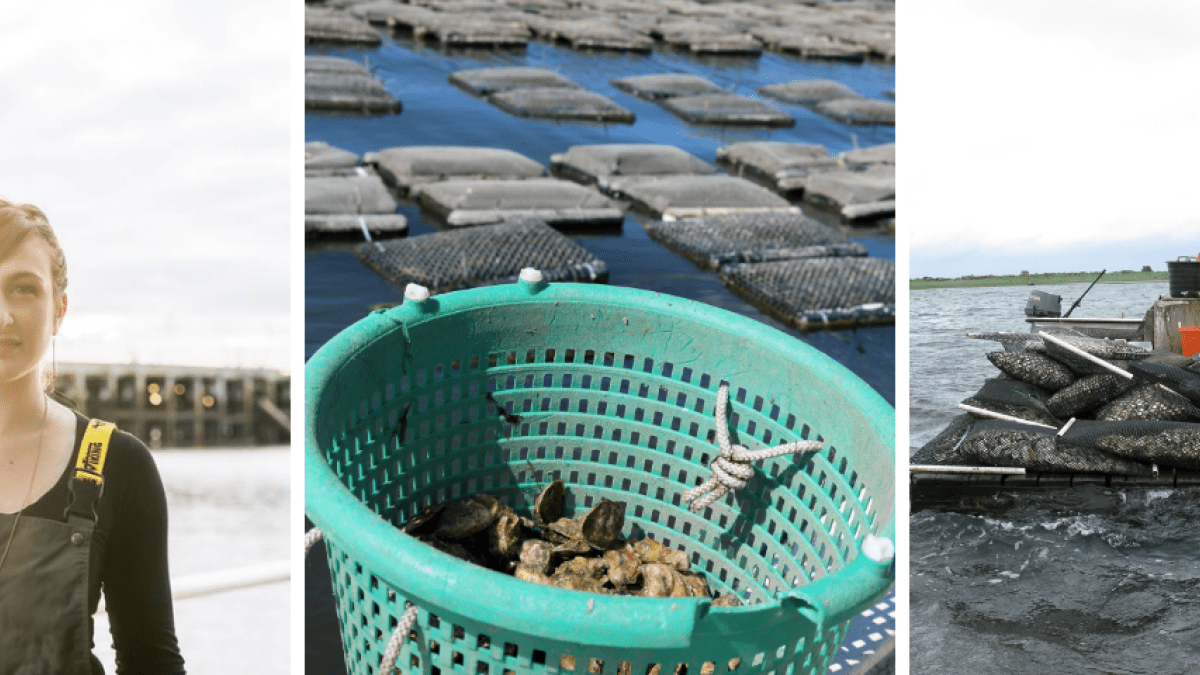Image

Contact: Stacie Pierpoint | stacie@naaee.org
Banner photo caption: Briana Warner, President/CEO of Atlantic Sea Farms, holds up kelp from a farm in Maine; Oyster harvest on a sustainable North Carolina shellfish farm. Cindy Sandoval/NOAA Fisheries; Oyster farmers return cages to the waters off of Nantucket, MA. Brianna Shaughnessy/NOAA.
FOR IMMEDIATE RELEASE
______________________________________________________________
NOAA and NAAEE Award First-of-Their-Kind Aquaculture Literacy Mini-Grants to Foster Outreach and Education
Washington, D.C – August 31, 2021
The North American Association for Environmental Education (NAAEE), in partnership with the National Oceanic and Atmospheric Administration (NOAA), is excited to award $150K to 10 projects that aim to enhance aquaculture literacy. These grants will support programming for a total of 4 NOAA Fisheries regions and their community members, many of whom have never had access to this level of aquaculture outreach and education resources. The 10 selected projects are serving 6 states, and include a variety of partnerships and collaborative activities.
These mini-grants will provide informal learning institutions (e.g., aquariums and visitor’s centers), aquaculture industry (e.g., shellfish, finfish, and seaweed farmers), and NOAA partners with support to co-develop innovative educational experiences that explore aquaculture topics. By requiring eligible applicants to build partnerships across the education, industry, and government sectors, NOAA and NAAEE are supporting innovative, first-of-their-kind efforts that pull from each sector’s unique expertise to address gaps in aquaculture literacy. Selected projects will implement locally relevant aquaculture literacy projects that enhance their audience’s understanding and engagement in aquaculture in their region.
Funding for this program is provided by NOAA Fisheries and administered by NAAEE. “We are thrilled to be part of this effort to enhance aquaculture literacy in communities across the nation,” said Kate Naughten, director of communications for NOAA Fisheries. “Much of our agency’s success is built on strong partnerships, so any time we can help engage communities and form new partnerships around the common goal of sustainable seafood we are all in.”
Supporting and implementing these cross-sectoral projects will provide each project’s audience(s) an opportunity to participate in high-quality programming that pairs aquaculture communication needs with existing research. In addition to using NOAA and NAAEE assets, these projects will make a significant contribution towards the overall success of NOAA’s sustainable aquaculture initiatives.
“Most of the public still has limited understanding of aquaculture and may encounter information that can be out of date, inaccurate, or incomplete,” said Cindy Sandoval, communications specialist for NOAA Fisheries Office of Aquaculture. “Having a trusted education source or community member share regional specific information can increase aquaculture and sustainable seafood literacy.”
These grants are part of eeBLUE, NAAEE’s effort to build collaborative partnerships that support the mutual environmental education goals of NOAA and NAAEE. “We hope that these mini-grants will enable connections between aquarium partners, industry, and NOAA experts, and I cannot think of a better home for this effort than eeBLUE,” said Christos Michalopoulos, deputy director of NOAA’s Office of Education. “NAAEE's expertise in sharing effective practices and scaling up innovative solutions will be an invaluable asset for these projects.”
“We are excited to dive deeper into our eeBLUE partnership with this wonderful initiative!” says T’Noya Thompson, Grants and Program Manager at NAAEE. Together, NAAEE and NOAA look forward to seeing how these unique projects and partnerships support aquaculture literacy.”
To learn more about the eeBLUE aquaculture initiative, visit: https://naaee.org/our-work/programs/eeblue/aquaculture-initiative
###
About eeBLUE
NAAEE is building partnerships that support the mutual science technology engineering math (STEM) education goals of the National Oceanic and Atmospheric Administration (NOAA) and the U.S. Department of Education through an exciting collaboration called eeBLUE. eeBLUE is a $5 million, five-year partnership agreement between NOAA and NAAEE to help create a more environmentally literate society that has the knowledge, skills, and motivation to conserve our natural resources and build more resilient communities across the country. It will also strengthen professional networks, support high-quality STEM education, and provide education and outreach for educators and other audiences.
To learn more and follow our partners’ eeBLUE journey, please visit our webpage and follow NAAEE on Facebook and Twitter @TheNAAEE.
About NAAEE
For five decades, the North American Association for Environmental Education (NAAEE) has served as the professional association, champion, and backbone organization for the field of environmental education (EE), working with EE professionals across United States, Canada, and Mexico, as well as globally, to advance environmental literacy and civic engagement to create a more equitable and sustainable future. For more information on NAAEE, visit https://naaee.org.
About NOAA
The National Oceanic and Atmospheric Administration (NOAA) is a U.S. government agency that enriches life through science. From daily weather forecasts, severe storm warnings, and climate monitoring to fisheries management, coastal restoration and supporting marine commerce, NOAA’s products and services support economic vitality and affect more than one-third of America’s gross domestic product. NOAA’s dedicated scientists use cutting-edge research and high-tech instrumentation to provide citizens, planners, emergency managers, and other decision-makers with reliable information they need when they need it.
The NOAA Office of Education works to advance education both within NOAA and with the public we serve. We provide scholarships and collaborate with universities to prepare the brightest minds from diverse backgrounds in NOAA-related fields. We offer competitive grants and establish partnerships to integrate NOAA science into schools and organizations. Lastly, we help coordinate educational activities across NOAA’s education community and with external partners to ensure that these efforts are effective and continually improved.